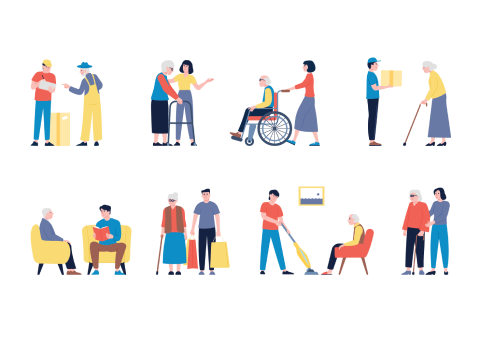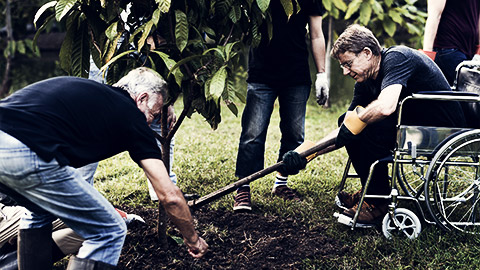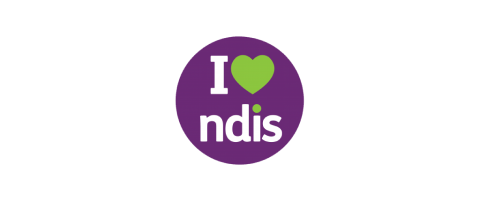Unit of Competency
This module consists of CHCDIS011 Contribute to ongoing skills development using a strengths-based approach.
Welcome to Module 12- CHCDIS011
This unit describes the skills and knowledge required to assist with supporting the ongoing skill development of a person with disability. It involves following and contributing to an established individual plan and using a positive, strengths-based approach.
This unit applies to individuals who work with people with disability in a range of community services and health contexts. Work performed requires some discretion and judgement and may be carried out under regular direct or indirect supervision.
The skills in this unit must be applied in accordance with Commonwealth and State/Territory legislation, Australian/New Zealand standards and industry codes of practice.
The key outcomes you will achieve upon completion of this module includes:
- Skills and knowledge to be effective in a disability care worker role in the community and/or within a residential setting.
- Learn about theories, concepts and strategies for skills development using a strength-based approach.
- Learn skills to contribute to skills assessment.
- Assist with ongoing skills development according to the individualised plan
- Support incidental learning opportunities to enhance skills development
- Legal and Ethical considerations in supporting the needs and protecting the rights of people with disability
- Complete documentation.
To achieve competency for the unit within this module, you must complete all theory assessments at the end of this module (short answer questions, case studies, project and role play) as well as the structured workplace learning and assessment (including Portfolio, logbook and any other workplace related documentation located in Module 16).
Before we begin, let us look at this video on people living with disability..
Living with a disability is a unique experience that challenges individuals physically, mentally, and emotionally. Unfortunately, many misconceptions and stereotypes persist in society, leading to misunderstanding and exclusion.
Write your thoughts about what you felt after watching this video!!

In this topic you will learn about current philosophies, theories and key concepts in disability. The roles and responsibilities of people working in disability sector. Legal and ethical considerations in disability sector and concepts of Access and equity. By the end of this topic, you will understand:
- Current philosophies, theories and support practices in disability
- Concepts in disability support
- Roles and responsibilities
- Legal and ethical considerations • Concepts of Access and Equity
Concepts, theories ,practices and philosophy in disability support
Before proceeding, What are the first few words, ideas, and thoughts that come to your mind when you hear the word disability? Let’s take a look at the World Health Organisation’s definition of disability, and see if any of it is similar to your answers:
Disability or disabilities It is an umbrella term, covering impairments, activity limitations, and participation restrictions. An impairment is a problem in body function or structure; an activity limitation is a difficulty encountered by an individual in executing a task or action; while a participation restriction is a problem experienced by an individual in involvement in life situations.
According to the Australian Government's Institute of Health and Welfare (AIHW) web report published in July 2022, nearly one in six Australians, around 4.4 million people had disability in 2018. Disability is any impairment of the body or mind that limits or restricts the persons activity and interaction with the environment around them. Disability varies in type, severity and can occur at any time of life, with the risk increasing with age. The AIHW report also found that people with disability are more likely to report poor general health and higher levels psychological distress compared to people without disability. Modifiable risk factors and behaviours such as lack of exercise, smoking and poor diet are also reported at a higher rate. As a support worker, you must understand that each client is a unique individual and make every effort to meet and respect their needs, preferences, choices and beliefs. Support workers need to find ways to empower, encourage and nurture the wellbeing of clients to maximise their skills and abilities to improve their quality of life.
Key Approaches, theories and philosophies in disability
Strengths-based approach
This approach emphasizes recognizing and building upon the strengths, abilities, and potential of individuals with disabilities. They promote a positive and empowering perspective, focusing on what individuals can do rather than their limitations. Here's an overview of the theory, philosophy, and current practices:
Theory: The strengths-based approach in disability is rooted in various theoretical frameworks, including:
Social Model of Disability: The social model of disability posits that disability is primarily caused by societal barriers rather than inherent impairments. This theory promotes removing barriers and creating inclusive environments that enable individuals with disabilities to fully participate in society, leveraging their strengths and abilities.
Positive Psychology: Positive psychology focuses on studying and promoting positive aspects of human experience, such as strengths, well-being, and resilience. Within the disability context, positive psychology emphasizes recognizing and developing strengths to enhance individuals' quality of life and promote their overall well-being.
Philosophy: The philosophy underlying the strengths-based approach in disability includes:
Person-Centeredness
Person-centered approaches prioritize the individual's autonomy, preferences, and goals. They involve actively involving individuals with disabilities in decision-making, valuing their perspectives, and tailoring support to their unique strengths and needs.
Empowerment and Self-Determination
Empowerment and self-determination philosophies promote the belief that individuals with disabilities should have control over their lives, make choices, and advocate for their rights. They aim to develop skills that enable individuals to express their preferences, assert their rights, and actively participate in their communities.
Strength based approach - practices
There are several current practices associated with the strengths-based approach in disability:
- Strengths-Based Assessments: Assessments focus on identifying and understanding an individual's strengths, abilities, and support needs. This information is used to develop personalized plans and interventions that build upon strengths to address specific goals.
- Person-Centered Planning: Person-centered planning involves actively involving individuals with disabilities in decision-making processes, considering their strengths, preferences, and aspirations. It ensures that supports and interventions align with their unique needs and promote their autonomy and self-determination.
- Positive Behavior Support: Positive Behavior Support (PBS) approaches focus on understanding the function and context of challenging behaviors and promoting positive alternatives. PBS interventions build on the individual's strengths and interests while providing support and strategies to address challenging behaviors.
- Skill Development Programs: Skill development programs emphasize identifying and nurturing individuals' existing strengths to enhance their skills and abilities. These programs provide opportunities for individuals to learn and practice skills that are relevant to their daily lives, promoting independence and community participation.
- Peer Support and Mentoring: Peer support and mentoring programs connect individuals with disabilities to peers who can provide guidance, support, and role modeling. These programs leverage the strengths and experiences of peers to promote skill development and enhance social inclusion.
Overall, the strengths-based approach in disability in Australia centers on recognizing and building upon the strengths, abilities, and potential of individuals with disabilities. It aligns with person-centeredness, empowerment, and self-determination, and is reflected in various current practices aimed at promoting positive outcomes and enhancing individuals' overall well-being.
Social Model theory and Social Devaluation

This is the belief of society that a person or a group of people with disabilities cannot contribute to society as much as those with no disability. As a result, people living with disabilities are viewed as having less value than others. Social devaluation can manifest in various ways, including:
- Stereotypes and Prejudice: Individuals with disabilities may be subject to negative stereotypes and prejudiced beliefs, such as assumptions of incompetence, dependency, or limited capabilities. These stereotypes can lead to lowered expectations, underestimation of abilities, and exclusion from opportunities.
- Stigmatization: Stigma associated with disability can lead to individuals being labeled, marginalized, and socially isolated. Stigmatizing attitudes may result in individuals with disabilities being seen as "other" or different from the societal norm, leading to exclusion and discrimination.
- Discrimination: Social devaluation may result in discriminatory practices and policies that limit the opportunities and rights of individuals with disabilities. This can include barriers in employment, education, housing, transportation, and social interactions, denying equal access and participation.
- Institutional Bias: Institutions and systems may perpetuate social devaluation through structural and systemic biases. These biases can manifest in the form of inaccessible environments, lack of accommodations, and inadequate support services, reinforcing social barriers and unequal treatment.
The consequences of social devaluation can be detrimental to individuals with disabilities, leading to lower self-esteem, reduced self-confidence, and limited opportunities for growth and development. It also affects their overall quality of life and hampers their ability to fully participate in society.
Theory of social model of disability
The social model of disability is a theory that views disability as a result of societal barriers, attitudes, and discrimination rather than an inherent individual impairment. It emphasizes the need to remove these barriers to enable full participation and inclusion of individuals with disabilities The social model of disability directly addresses social devaluation by shifting the focus from the individual's impairments to the barriers and inequalities present in society. It recognizes that disability is not an inherent problem within individuals but rather a result of inaccessible environments, discriminatory attitudes, and systemic exclusions. By highlighting the social and environmental factors that contribute to disability, the social model seeks to challenge and eliminate these barriers. It advocates for inclusive policies, accessible environments, and attitudinal changes to promote equal rights, opportunities, and participation for individuals with disabilities. The social model aims to empower individuals, challenge negative stereotypes, and dismantle social devaluation by promoting social inclusion, equality, and respect for the rights and dignity of people with disabilities.
Competency and image enhancement as a means of addressing devaluation
Competency and image enhancement play a crucial role in addressing devaluation by emphasizing and promoting individuals' strengths and positive attributes. By recognizing and highlighting their competencies, skills, and achievements, it helps counter negative stereotypes, challenges devaluation, and promotes a positive perception of their abilities Using assessments that identify and highlight an individual's strengths, skills, and competencies. These assessments provide a foundation for building self-confidence and challenging devaluation by emphasizing the individual's positive attributes. By emphasizing competency, the strength-based approach aims to develop and enhance the individual's skills, knowledge, and abilities in areas where they excel. This process not only fosters a sense of mastery and accomplishment but also helps individuals gain confidence and competence in various aspects of their lives. By recognizing and valuing their competencies, the approach helps individuals combat the negative effects of devaluation and promotes a positive self-image.
Person centred approach and practices
Underlying Philosophy
The philosophies underlying person-centred practice include respect for individual dignity, promoting self-determination, and recognizing the person's expertise in their own life. It also values the importance of building genuine and trusting relationships between the person with a disability and their support network.
Theories of person centred practice
- Social Model of Disability: This theory emphasizes that disability is not solely an individual's impairment but is also influenced by societal barriers. It focuses on removing these barriers and creating an inclusive environment that enables individuals to maximize their abilities and strengths.
- Self-Determination Theory (SDT) emphasizes the importance of individuals having control and autonomy over their own lives. It highlights the need for individuals to feel competent, autonomous, and connected to others. In the context of skills development, SDT suggests that individuals with disabilities should be actively involved in decision-making, goal-setting, and planning for their own skill development. It promotes the recognition of individuals' strengths, interests, and preferences, and encourages the provision of supports and opportunities that align with their unique needs and aspirations.
- Strengths-Based Approach: This approach highlights an individual's existing strengths, skills, and capabilities rather than focusing solely on deficits or limitations. It aims to build on these strengths to develop new skills and abilities, fostering empowerment and positive self-identity.
Current practices in person-centred practice for individuals with disabilities
The current practices include:
- Individualized Support Planning: Collaborating with the person with a disability, their family, and support networks to develop a personalized plan that reflects their goals, strengths, and aspirations.
- Active Participation: Encouraging individuals with disabilities to actively participate in decision-making, goal-setting, and evaluating their own progress.
- Supported Decision-Making: Providing appropriate support to individuals with disabilities to make decisions based on their abilities, preferences, and values.
- Advocacy: Supporting individuals with disabilities to advocate for their rights, access to services, and inclusion within their communities.
- Accessibility and Universal Design: Ensuring that environments, services, and information are accessible to individuals with disabilities, promoting their full participation and inclusion
Current practices which focus on the individual person
Current practices in disability that focus on the individual person emphasize promoting inclusion, accessibility, and empowerment. These practices recognize that disability is a social construct influenced by environmental and attitudinal barriers, and they aim to remove those barriers and enhance the overall well-being of individuals with disabilities. Here are some key aspects of these practices:
- Person-Centered Planning: This practice involves collaborative planning and decision-making, where the individual with a disability, their support network, and service providers come together to create a personalized plan. The plan reflects the individual's goals, preferences, and needs, ensuring that support is tailored to their unique circumstances.
- Individualized Support Plans: Individualized support plans are customized plans that outline the specific support and services required by the individual. These plans take into account the person's strengths, preferences, and goals, providing a framework for delivering personalized and targeted support.
- Supported Decision-Making: Supported decision-making is an approach that recognizes and respects the individual's right to make decisions about their own life. It involves providing the necessary support, information, and resources to enable the person with a disability to make informed choices and have their decisions respected.
- Self-Directed Funding Models: Self-directed funding models give individuals with disabilities greater control and autonomy over the funds allocated for their support. Instead of predetermined services, individuals can choose how to allocate their funding, allowing them to tailor their support to their specific needs and goals.
- Assistive Technologies and Communication Tools: The use of assistive technologies and communication tools is a current practice that focuses on the individual person in disability support. These tools enhance the individual's ability to communicate, access information, and participate in various activities, promoting independence, inclusion, and empowerment.
Current practices in capacity building and community education

This includes programs to promote learning and social development work with individuals and groups in their communities using formal and informal teaching and learning methods. Capacity Building is developing a person’s skills and capabilities to promote their independence. It is demonstrated by doing a task with the person rather than doing a task for that person. Several current practices in the context of community education and capacity building align with skills development using a strengths-based approach. Here are some examples:
- Asset-Based Community Development (ABCD): ABCD focuses on identifying and mobilizing the existing strengths and resources within a community. It involves engaging community members in identifying their skills, talents, and assets, and utilizing them to address challenges and promote development. This approach recognizes that communities have inherent strengths and can drive their own growth.
- Strengths Assessment and Development: Conducting strengths assessments allows individuals to identify and build upon their existing skills, talents, and abilities. Through various assessment tools and techniques, such as surveys, interviews, and observations, individuals can recognize their strengths and focus on enhancing them further. This approach fosters self-awareness and empowerment.
- Experiential Learning: Experiential learning involves learning through hands-on experiences and real-world applications. It emphasizes active participation, reflection, and feedback. By engaging in experiential learning activities, individuals can develop and refine their skills, apply theoretical knowledge in practical situations, and build confidence in their abilities.
- Collaborative Learning Communities: Collaborative learning communities bring together individuals with shared interests, goals, or learning needs to engage in collective skill development. These communities provide a supportive and inclusive environment where individuals can share knowledge, exchange experiences, and learn from one another's strengths. Peer support and collaboration promote skill development and a sense of belonging.
- Mentoring and Coaching: Mentoring and coaching programs connect individuals with experienced mentors or coaches who can provide guidance, support, and feedback. Mentors and coaches focus on nurturing individuals' strengths, offering encouragement, and helping them develop new skills. This approach promotes personalized learning, skill transfer, and confidence-building.
- Project-Based Learning: Project-based learning involves tackling real-world projects or challenges that require the application of various skills. Individuals work collaboratively on projects, which enhances their problem-solving abilities, critical thinking skills, and teamwork. This practice allows individuals to develop and showcase their strengths while acquiring new skills in a practical context.
- Recognition and Celebration of Achievements: Recognizing and celebrating individuals' achievements and strengths is an important aspect of a strengths-based approach. By acknowledging and valuing their progress, efforts, and unique abilities, individuals are motivated to continue developing their skills and feel a sense of accomplishment.
These current practices in community education and capacity building prioritize individuals' strengths, provide opportunities for skill development in practical and collaborative settings, and foster a sense of empowerment and engagement. By focusing on strengths, these approaches create positive learning experiences and promote the development of well-rounded skills within the community.
Transformational Theory and its relevance in skills development using strength based approach
Transformational learning theory, developed by Jack Mezirow, suggests that learning involves a transformative process that challenges and transforms an individual's beliefs, attitudes, and perspectives. In community education and capacity building, this theory highlights the importance of creating learning experiences that encourage critical reflection, personal growth, and transformative change. A strengths-based approach can facilitate this transformation by empowering individuals to recognize and build upon their strengths, leading to a shift in self-perception and expanded possibilities for skill development.
Social and emotional wellbeing framework
Underlying philosophy
The underlying philosophy of social and emotional wellbeing frameworks is centered around the belief that individuals' mental and emotional well-being are fundamental to their overall development and success. It recognizes the importance of nurturing positive social and emotional skills as essential components of a strengths-based approach to skills development.
Benefits of using a strengths-based approach in social and emotional wellbeing frameworks for skills development.
The benefits of using a strengths-based approach in social and emotional wellbeing frameworks for skills development include increased self-awareness, improved emotional regulation, enhanced interpersonal skills, better coping mechanisms, increased resilience, and overall improved mental well-being.
How does the framework contribute to skills development?
Social and emotional wellbeing frameworks contribute to skills development by providing a foundation for individuals to understand and manage their emotions, establish positive relationships, cope with challenges, and make responsible decisions. These frameworks help individuals develop the necessary skills to navigate various social and emotional contexts effectively.
Other Concepts in Disability Support
The following concepts are encountered in the provision of support to people with disability.
Vulnerability
In the context of disability, vulnerability refers to the increased susceptibility of individuals with disabilities to various risks and challenges. People with disabilities may face barriers and discrimination that can limit their access to education, employment, healthcare, and social inclusion. They may also experience higher rates of abuse, neglect, and exploitation. Recognizing and addressing the vulnerabilities of individuals with disabilities is crucial to ensure their rights, well-being, and full participation in society. This is the characteristic of being easily hurt or attacked by others. People with disability are oftentimes vulnerable to discrimination and bullying in different settings (e.g. education, corporate, community), and even abuse and neglect by others.
Power
In the context of disability support, this is the ability and capacity of the person with adisability to decide on matters relevant to their support.This power enables the person to enjoy and gain control over their life. Power refers to the ability to influence and make decisions that affect one's own life and the lives of others. In the disability context, power imbalances may arise due to societal attitudes, policies, and practices that marginalize or exclude people with disabilities. Power can be held by individuals, institutions, or systems. Empowering people with disabilities involves giving them the necessary tools, resources, and opportunities to exercise control over their lives, make choices, and have a voice in decision-making processes that affect them.
Independence
Independence refers to the ability of individuals to live and function without excessive reliance on others. In the disability context, independence can be understood in different ways. While some individuals with disabilities strive for maximum independence in performing daily activities, it is important to acknowledge that not everyone can achieve complete independence due to the nature and extent of their disabilities. Independence should be understood as a spectrum, and support systems should be in place to enable individuals with disabilities to exercise autonomy and make decisions to the best of their abilities. Independence or independent living is living, working, playing just like everyone else with minimum support from others. Independence of people with disability is promoted through the use of aids and equipment and through skills development Interdependence Interdependence emphasizes the mutual reliance and interconnectedness among individuals and communities. In the context of disability, interdependence recognizes that everyone, regardless of ability, relies on others for support, collaboration, and social connection. People with disabilities may require assistance and support from others to participate fully in society.
Interdependence
promotes the notion that individuals with disabilities have valuable contributions to make and that society benefits when everyone's abilities and strengths are recognized and utilized. Building inclusive and supportive communities fosters interdependence and enables individuals with disabilities to live meaningful and fulfilling lives. This is the mutual reliance between the person with disability and others (e.g. family, carer, individual support worker). In this concept, the person with disability does not take a passive role in the provision of their support, but instead, they take an active part which the family, carers, and individual support workers.

Role of Human Rights
As a support worker, you need a thorough understanding of human rights, how this relates to people receiving care and support and the services we provide them (service framework), duty of care, dignity of risk, plus mandatory reporting, privacy, confidentiality and disclosure.
Human Rights
The United Nations Convention on the Rights of Persons with Disabilities (UNCRPD) is an international treaty aimed at protecting the rights and quality of life of people with disabilities. It came into force in 2008 and identifies what governments must do to protect and ensure the rights of people with disabilities. Australia has both signed and ratified (made official) the CRPD. The United Nations Convention on the Rights of Persons with Disabilities (UNCRPD) hence it is the main framework under the Human rights framework of service which protects the rights of persons with disabilities. In your role as a support worker, you need to understand the core concepts of CRPD as these relate to the services you provide.
Legal and Ethical aspects
When working with people with disabilities in Australia, there are several legal and ethical considerations to keep in mind. These considerations include applicable laws, acts, and state-based legislations, particularly in the context of duty of care, dignity of risk, privacy, confidentiality, and disclosure. Here are some key points related to each of these areas:
- Duty of Care:
- Duty of care refers to the legal obligation to ensure the safety, well-being, and protection of individuals with disabilities.
- The Disability Discrimination Act 1992 (DDA) and the Disability Inclusion Act 2014 (New South Wales) outline the responsibilities and obligations to prevent discrimination and provide appropriate support and services.
- Duty of care requires taking reasonable steps to identify and mitigate risks, providing appropriate support, and ensuring the safety and welfare of individuals with disabilities.
- Dignity of Risk:
- Dignity of risk recognizes that individuals with disabilities have the right to make their own choices and decisions, even if those choices involve some level of risk.
- It is essential to respect the autonomy and self-determination of individuals with disabilities while balancing the need to ensure their safety.
- Legislation such as the National Disability Insurance Scheme Act 2013 (NDIS Act) in Australia upholds the principle of dignity of risk and supports individuals' choice and control over their own lives.
- Privacy, Confidentiality, and Disclosure:
- Privacy laws protect the personal information of individuals with disabilities and dictate how their information is collected, used, and disclosed.
- The Privacy Act 1988 and its Australian Privacy Principles (APPs) provide a framework for handling personal information in both public and private sectors.
- When working with people with disabilities, it is crucial to obtain informed consent before collecting, using, or disclosing their personal information.
- Confidentiality must be maintained regarding any sensitive information shared by individuals with disabilities, unless there are legal obligations or risks to their safety or the safety of others that require disclosure.
It is important to note that the legal and ethical considerations for working with people with disabilities may vary slightly across different states and territories in Australia. It is recommended to consult specific state-based legislations and relevant codes of practice to ensure compliance with local requirements and obligations. Additionally, seeking guidance from professional bodies, disability advocacy organizations, and legal experts can provide further insights into the legal and ethical considerations in this context.
The National Disability Insurance Scheme (NDIS)
The National Disability Insurance Scheme (NDIS) plays a significant role in Australia's disability sector. It is a national scheme that provides support and services to individuals with disabilities, aiming to enhance their independence, social participation, and overall well-being. When working in the disability field in Australia, there are legal and ethical obligations that professionals and service providers must adhere to. Here are some key points regarding the NDIS's role and the associated obligations:
NDIS Role

The NDIS is responsible for the administration and funding of disability supports and services. It operates under the National Disability Insurance Scheme Act 2013 (NDIS Act) and associated rules and regulations. The NDIS assists eligible individuals with disabilities by providing funding for reasonable and necessary supports, including assistive technologies, therapies, personal care, and community participation.
Legal Obligations:
- Professionals and service providers working within the NDIS must comply with the NDIS Act and associated regulations.
- They must provide supports and services that meet the criteria of being "reasonable and necessary" for the participant's disability-related needs.
- It is essential to maintain accurate records, submit required documentation, and meet reporting obligations as outlined by the NDIS.
Ethical Obligations:
- Professionals and service providers must adhere to ethical standards and principles when working with people with disabilities.
- This includes promoting the autonomy, dignity, and rights of individuals with disabilities, and respecting their choices and decisions.
- Ethical obligations involve maintaining confidentiality, ensuring privacy, and obtaining informed consent from participants before providing supports or disclosing their personal information.
- Professionals should also strive for cultural competence, inclusivity, and non-discriminatory practices, respecting the diverse needs and backgrounds of individuals with disabilities.
Quality and Safeguarding: The NDIS Quality and Safeguarding Framework outlines the standards and safeguards that must be upheld by professionals and service providers. This framework ensures the provision of high-quality supports and services, protects the rights and well-being of participants, and addresses any concerns or complaints. Compliance with the NDIS Code of Conduct, which outlines the expected behaviors and professional standards for workers in the disability sector, is essential. It is crucial for professionals and service providers working in the disability sector in Australia to stay informed about the latest updates, guidelines, and requirements of the NDIS. They should also seek ongoing professional development and engage in reflective practices to ensure they are meeting their legal and ethical obligations and providing the best possible support to individuals with disabilities.
Other relevant legislative requirements include:
In Australia, there are several legislative requirements and relevant laws that pertain to disability. Here are some of more legislative requirements in addition to the above:
- Disability Standards: The Disability Discrimination Act includes several disability standards that provide guidance on how to eliminate discrimination and ensure equal access and participation for people with disabilities. Some of the key standards include the Disability Standards for Accessible Public Transport, Disability Standards for Education, and Disability (Access to Premises - Buildings) Standards.
- Work Health and Safety Laws: Each state and territory in Australia has its own work health and safety (WHS) legislation, which aims to ensure the health, safety, and welfare of all workers, including those with disabilities. These laws require employers to provide a safe work environment, assess and manage risks, and consult with workers to address their specific needs.
- Carers Recognition Act 2010: This act recognizes the role of carers and their valuable contribution to society, including those who provide care and support to individuals with disabilities. It establishes principles for the recognition and support of carers, emphasizing the importance of their wellbeing and the need for appropriate support services.
- State and Territory Legislation: In addition to the federal laws mentioned above, each Australian state and territory has its own legislation and policies related to disability. These may include specific disability services acts, guardianship laws, accessibility standards, and anti-discrimination laws that complement the federal legislation. It's important to note that laws and regulations can vary over time, so it is recommended to refer to the most up-to-date legislation and seek professional legal advice when necessary.
Ethical Considerations
In the disability sector in Australia, there are several ethical considerations that guide the practices and interactions with individuals with disabilities. Here are some key ethical considerations:
- Autonomy and Respect for Individual Choices: Respecting the autonomy and dignity of individuals with disabilities is crucial. It involves recognizing and honoring their right to make decisions and choices about their own lives, including their care, support, and participation in decision-making processes.
- Person-Centered Approach: Embracing a person-centered approach means placing the individual with a disability at the center of decision-making and tailoring support and services to their unique needs, preferences, and goals. It involves actively involving them in planning, setting goals, and determining their own pathway.
- Informed Consent: Obtaining informed consent is vital in the disability sector. It means ensuring that individuals with disabilities have access to all relevant information and understand the potential risks, benefits, and consequences of their decisions. Informed consent enables individuals to make voluntary and autonomous choices about their care, treatment, and participation in programs or services.
- Confidentiality and Privacy: Respecting the confidentiality and privacy of individuals with disabilities is essential. This involves safeguarding their personal information and ensuring that it is only accessed and disclosed to authorized individuals on a need-to-know basis. Privacy and confidentiality promote trust, respect, and the protection of personal rights.
- Non-Discrimination and Equality: The ethical principle of non-discrimination promotes equal treatment, opportunities, and access to services for individuals with disabilities. It means ensuring that no one is subjected to unfair or unjust treatment based on their disability, and actively working to eliminate discriminatory practices and attitudes.
- Cultural Sensitivity and Inclusivity: Recognizing and valuing the diversity of individuals with disabilities, including their cultural, linguistic, religious, and social backgrounds, is important. Cultural sensitivity and inclusivity involve understanding and respecting different cultural perspectives, beliefs, and practices, and adapting support services to be inclusive and accessible for all.
- Duty of Care: Ethical practice in the disability sector requires upholding a duty of care towards individuals with disabilities. This involves taking reasonable steps to ensure their safety, well-being, and protection from harm. It also includes actively promoting their rights, advocating on their behalf, and providing appropriate support and assistance.
- Continuous Learning and Professional Development: Ethical practice in the disability sector involves a commitment to ongoing learning, professional development, and staying updated with current research, best practices, and emerging trends. This ensures that practitioners can provide high-quality and evidence-based support to individuals with disabilities.
It is important for professionals working in the disability sector to adhere to these ethical considerations and to consult relevant codes of conduct, guidelines, and professional standards established by regulatory bodies and professional associations. These ethical considerations help create a supportive, empowering, and inclusive environment for individuals with disabilities.

There are various roles and responsibilities involved in the field of disability support and inclusion. Here are some key roles and their corresponding responsibilities:
Disability Support Worker/Personal Support Worker
Support workers are individuals who directly assist and support people with disabilities in their daily lives. Their primary role is to provide practical assistance, emotional support, and facilitate the overall well-being of individuals with disabilities. The main roles and responsibilities of support workers are:
- Direct Support: Support workers have the responsibility to provide direct assistance and support to individuals with disabilities. This can include helping with personal care, mobility, household tasks, and facilitating community engagement. They should ensure the well-being, dignity, and safety of the person they are supporting, while promoting their independence and autonomy.
- Communication and Advocacy: Support workers need to effectively communicate with individuals with disabilities to understand their needs, preferences, and goals. They should advocate for the rights and interests of the person they are supporting, ensuring their voice is heard and respected. This includes communicating any concerns, issues, or progress to supervisors and relevant professionals.
- Documentation and Reporting: Support workers are responsible for maintaining accurate records of their interactions and activities with individuals with disabilities. This involves documenting the support provided, any incidents or changes in the person's condition, and following proper reporting procedures as per organizational policies and protocols. This information helps in tracking progress, assessing needs, and ensuring continuity of care
In a nutshell, the support workers are people who provide care in terms of:
- Assisting individuals with daily activities such as personal care, mobility, and communication.
- Providing emotional support and companionship.
- Implementing individualized care plans and strategies.
- Facilitating community engagement and social inclusion.
- Monitoring and documenting the progress and well-being of individuals.
- Advocating for the rights and needs of individuals with disabilities.
Health Professionals
Health professionals, such as doctors, nurses, therapists, and psychologists, play an essential role in the provision of disability support. They assess, diagnose, and provide medical treatment, therapy, and interventions to individuals with disabilities. The main resposnsibilities of health professionals includes:
- Assessment and Diagnosis: Health professionals have a responsibility to conduct thorough assessments and provide accurate diagnoses of disabilities. This involves evaluating physical, cognitive, and psychological aspects to determine the specific needs and potential challenges faced by individuals with disabilities.
- Treatment and Intervention: Health professionals develop and implement appropriate treatment plans and interventions to address the specific needs of individuals with disabilities. This can include medical interventions, therapies, rehabilitation programs, and assistive technologies. They should monitor progress, adjust interventions as necessary, and provide ongoing support and guidance.
- Collaboration and Referrals: Health professionals collaborate with other professionals and agencies involved in disability support. This includes referring individuals to specialized services, therapists, or support programs that can enhance their well-being and quality of life. Health professionals should also communicate and share relevant information with other stakeholders, ensuring a coordinated and holistic approach to support individuals with disabilities
Case Managers/ Supervisors
Supervisors in the context of disability support are responsible for overseeing the work of support workers. Their main roles and responsibilities entails:
- Staff Coordination and Training: Supervisors are responsible for coordinating the work of support workers. They should assign tasks, provide guidance, and ensure adequate staffing levels to meet the needs of individuals with disabilities. Supervisors also have the responsibility to provide training and ongoing professional development to support workers, enabling them to deliver quality support services.
- Quality Assurance: Supervisors play a crucial role in ensuring the quality of support services. They should monitor and evaluate the work of support workers, providing constructive feedback and addressing any performance issues. They should also review and maintain compliance with relevant policies, procedures, and regulations to ensure the safety, well-being, and rights of individuals with disabilities.
- Collaboration and Liaison: Supervisors need to collaborate with other professionals, agencies, and stakeholders involved in disability support. This includes liaising with families, health professionals, and service providers to ensure effective coordination of care and support. Supervisors should foster a collaborative and person-centered approach, promoting the holistic well-being of individuals with disabilities.
Carers
These are individuals who provide support and assistance to family members or friends with disabilities. They may be unpaid family members, partners, or close friends. Carers play a significant role in the lives of individuals with disabilities, offering emotional support, coordinating medical appointments, assisting with daily activities, and advocating for their rights and needs. Carers often take on multiple responsibilities and contribute to the overall well-being and quality of life of the person with a disability. There main responsibilities entails:
- Personal Care and Assistance: Carers have the responsibility to provide personal care and assistance to individuals with disabilities. This can include supporting with daily activities, medication management, meal preparation, and emotional support. Carers should prioritize the well-being and comfort of the person they are caring for, while respecting their autonomy and preferences.
- Emotional Support and Companionship: Carers play a vital role in providing emotional support and companionship to individuals with disabilities. They should actively listen, engage in meaningful conversations, and offer empathy and understanding. Carers should create a nurturing and supportive environment that promotes the individual's emotional well-being and social connections.
- Advocacy and Empowerment: Carers have a responsibility to advocate for the rights, needs, and choices of individuals with disabilities. This involves being knowledgeable about available support services, resources, and rights-related legislation. Carers should empower the person they are caring for, assisting them in making informed decisions, and ensuring their preferences and concerns are respected and addressed.
Family members
Family members of individuals with disabilities are a vital part of the support system. They provide emotional support, care, and advocacy for their family member with a disability. There main responsibilities entail:
- Support and Collaboration: Family members have a responsibility to provide support and collaborate with other stakeholders involved in disability support. This includes actively participating in the planning and decision-making processes, sharing relevant information, and contributing to the individual's care and well-being.
- Emotional and Practical Assistance: Families provide emotional and practical assistance to individuals with disabilities. They should offer encouragement, understanding, and a nurturing environment. Families may also help with daily activities, transportation, and facilitating social connections.
- Education and Awareness: Family members have a responsibility to educate themselves about the specific disability and its implications. They should stay informed about available support services, therapies, and community
Special Education Teacher
The role of a Special Education Teacher is crucial in supporting the educational needs of students with disabilities. Here are some key responsibilities and roles of a Special Education Teacher:
- Individualized Education Planning: Special Education Teachers collaborate with other professionals, parents, and caregivers to develop and implement individualized education plans (IEPs) for students with disabilities. They assess students' strengths and needs, set goals, and design instructional strategies and accommodations to meet their unique learning requirements.
- Differentiated Instruction: Special Education Teachers adapt and modify instructional materials, methods, and assessments to ensure accessibility and meaningful learning for students with disabilities. They employ a variety of teaching strategies to address diverse learning styles, abilities, and needs, promoting inclusivity in the classroom.
- Direct Instruction and Support: Special Education Teachers provide direct instruction and support to students with disabilities in various academic and functional skill areas. They may deliver specialized lessons, interventions, or therapies to help students achieve their educational goals. They also provide guidance and assistance with organization, time management, and social skills development.
- Collaboration and Consultation: Special Education Teachers collaborate with general education teachers, support staff, and related service providers to ensure a cohesive and inclusive learning environment. They participate in team meetings, share information, and provide guidance on instructional strategies and accommodations to facilitate student success.
- Progress Monitoring and Assessment: Special Education Teachers regularly assess and monitor student progress to determine the effectiveness of instructional interventions and accommodations. They use a variety of assessment tools and techniques to gather data, track growth, and make informed instructional decisions. They also participate in the evaluation and reporting of student progress during IEP meetings.
Disability Advocate
Disability advocates are individuals or organizations that work to promote the rights, inclusion, and well-being of people with disabilities. They play a crucial role in advocating for policy changes, raising awareness, and ensuring that the voices of individuals with disabilities are heard. Here are some key strategies and techniques that disability advocates can adopt:
- Empowerment and Collaboration: Work in partnership with the person with a disability, involving them in decision-making processes and respecting their autonomy. Support them in self-advocacy by helping them develop their skills, confidence, and knowledge about their rights and options.
- Active Listening and Understanding: Take the time to actively listen to the person's experiences, concerns, and goals. Seek to understand their perspective and the specific challenges they face. This will help inform your advocacy efforts and ensure their needs are accurately represented.
- Education and Awareness: Raise awareness about the rights, needs, and abilities of people with disabilities within relevant communities, organizations, and institutions. Provide accurate and up-to-date information to dispel misconceptions and promote understanding and inclusion.
- Collaboration and Networking: Build relationships with other individuals, organizations, and stakeholders in the disability community. Collaborate with them to leverage collective resources, knowledge, and influence for more impactful advocacy. This can include disability advocacy groups, support organizations, professionals, and policymakers.
- Research and Evidence: Gather relevant research, data, and evidence to support your advocacy efforts. Use this information to highlight the importance of addressing specific issues, advocating for policy changes, or improving services and support systems.
- Effective Communication: Communicate clearly, concisely, and persuasively when advocating. Tailor your message to different audiences and present information in a way that is accessible and relatable. Utilize personal stories and lived experiences to illustrate the impact of certain policies or practices.
- Use of Media and Technology: Utilize various media platforms, including social media, blogs, and traditional media outlets, to raise awareness, share stories, and advocate for change. Leverage technology to amplify the voices of people with disabilities and engage a broader audience.
- Policy and System Change: Advocate for changes in laws, policies, and systems that impact people with disabilities. Collaborate with policymakers, participate in consultations, provide recommendations, and engage in grassroots efforts to drive meaningful change at local, regional, and national levels.
These can vary depending on the specific context, setting, and individual needs. Collaboration and interdisciplinary teamwork are often essential in providing comprehensive and effective support to individuals with disabilities.

These two interconnected concepts that help us understand the various ways in which people with disabilities face discrimination and barriers in society. Let's explore these concepts with examples and scenarios:
Individual Discrimination
Individual discrimination refers to acts or behaviors by individuals that unfairly treat or disadvantage people with disabilities based on their disability. It occurs on a personal level and can be intentional or unintentional. Examples of individual discrimination in disability include: Scenario: A person with a physical disability goes to a restaurant with their friends. The restaurant staff refuses to provide a wheelchair-accessible table, stating that it's inconvenient and would disrupt other customers. This is an act of individual discrimination as the restaurant staff is directly treating the person with a disability unfairly and denying them equal access to services.
Structural Discrimination
Structural discrimination refers to the systematic and institutionalized barriers that are embedded within society's structures, policies, and practices, resulting in the exclusion or disadvantage of people with disabilities. It is often unintentional and can perpetuate unequal treatment and opportunities. Examples of structural discrimination in disability include: Scenario: A university has limited accessibility features such as ramps and elevators, making it difficult for students with mobility impairments to navigate the campus. This structural discrimination creates barriers to education and limits the participation of students with disabilities.
Scenario: An employer has a hiring policy that requires job applicants to have a driver's license, even for positions that don't require driving. This policy discriminates against individuals with visual impairments who are unable to obtain a driver's license, resulting in their exclusion from employment opportunities. This is an example of structural discrimination within the workplace. It's important to note that individual and structural discrimination often intersect and reinforce each other. Individual discriminatory acts can be influenced by broader structural factors, such as societal attitudes, stereotypes, and systemic barriers. Similarly, structural discrimination can be perpetuated and enforced by individuals within various institutions. Addressing both individual and structural discrimination requires a multi-faceted approach, including raising awareness, promoting inclusive policies, challenging stereotypes, improving accessibility, and advocating for equal rights and opportunities for people with disabilities.
Principles of Access and Equity
Practices, legal and ethical considerations, and standards in the provision of disability support services align with the principles of access and equity. Individual support workers and support service providers aim to provide services in accordance with these principles.
What are access and equity?
Access: The principle of access emphasizes removing barriers and creating environments that enable people with disabilities to fully participate in all aspects of life. It involves providing physical, social, and attitudinal access to various domains, including education, employment, transportation, healthcare, public spaces, and information and communication technologie
Equity: The principle of equity focuses on ensuring fairness and justice by recognizing that individuals with disabilities may require additional supports and accommodations to achieve equal opportunities. It involves addressing systemic barriers and providing targeted resources to level the playing field for people with disabilities.
Access means services should be available to everyone who is entitled to them and should be free of any form of discrimination regardless of the person’s country of birth, language, culture, race, religion or disability. Equity means services should be developed and delivered by fair treatment of clients who are eligible to receive them.
We will learn about more relevant practices and theories in skills development using strength based approach as we move through the next topics
Now its your turn
